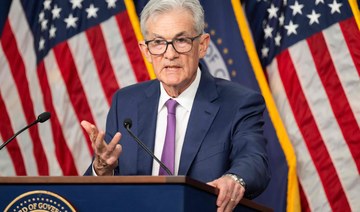KARACHI: The State Bank of Pakistan on Friday increased its baseline interest rate by 150 basis points from 8.5 percent to 10 percent. Explaining the decision, which was above market expectations, the bank said “further consolidation is required to ensure macroeconomic stability.”
Muzamil Aslam, a senior economist, said: “The market was expecting an increase of 100 basis points.
“Though economic indicators are favorable, the 1.5 percent hike shows that they are under pressure from the International Monetary Fund.”
The IMF had been pushing Pakistan to push the key policy rate into double digits.
The SBP said: “The opinion of the Monetary Policy Committee is that with the exchange rate reflecting a demand-supply gap in the foreign-exchange market, the adoption of a flexible inflation-targeting framework will help anchor inflation expectations. Improving productivity and competitiveness of exports will have to play a prominent role to reduce the external-trade deficit, and the fiscal policy will have to be proactive and play a supportive role to generate conditions for a sustainable growth path”.
Average headline consumer price index (CPI) inflation during the first four months of the current fiscal year (FY19) rose to 5.9 percent, compared with 3.5 percent during the corresponding period of FY18, the bank noted.
Its forecasts suggest average CPI inflation for FY19 of between 6.5 percent and 7.5 percent, a little above the target of 6 percent. Although the recent decline in international oil prices might help to ease inflation, the risks currently remain tilted toward the downside.
Taking a lead from recent large-scale manufacturing data, economic activity is expected to be moderate during FY19, reflecting the short-term cost of pursuing macroeconomic stability.
SBP predicts that real gross domestic product growth for FY19 will be slightly more than 4 percent. The cumulative effects of a 275 basis point increase in the interest rate since January 2018 and other policy measures are likely to suppress domestic demand during the current fiscal year. Initial estimates for major crops, except wheat, are expected to fall short of levels achieved in the previous year. The slowdown in commodity-producing sectors is expected to limit expansion in the services sector as well.
Import growth fell to 5.8 percent during July-Oct. FY19 from 26.3 percent during the same period a year ago, reflecting the impact of recent belt-tightening measures. The remaining growth is mainly the result of the increased cost of oil because of higher international prices. Non-oil imports fell by 4 percent during the first four months of FY19. This, along with continued increases in exports and remittances from overseas Pakistanis, narrowed the external current-account deficit from $5.1 billion in July-Oct. FY18 to $4.8 billion during the same period in FY19, a net improvement of 4.6 percent.
“Despite these positive developments, SBP’s net liquid foreign-exchange reserves remained under pressure, falling to $8.1 billion as of November 23, 2018, from $9.8 billion at the end of FY18”, the bank added.
Looking to the future, there is an expectation of higher foreign inflows from both private and official sources during the second half of FY19. In addition, recent bilateral financial agreements, including a deferred oil-payment facility from Saudi Arabia, will be available to the market from January 2019. The projected decrease in the current-account deficit, which might be further supported by the recent decline in international oil prices, are likely to instill confidence in the foreign-exchange market. These developments could help reduce the pressures on SBP’s foreign-exchange reserves.
During the first four and a half months of FY19, almost all of the liquidity in the banking system was generated through an increase in net domestic assets (NDA) as net foreign assets continued to contract. Besides an increase in budgetary borrowings from SBP, relatively higher credit flows to the private sector have been the major contributor to the NDA increase.
Despite contractionary monetary conditions, an increase in working-capital needs, due to capacity additions in the past three years and recent substantial increases in input prices, are the main reasons behind relatively higher credit flows to the private sector.
The bank’s Monetary Policy Committee noted that the continuing inflationary pressure from rising inflationary expectations needs to be checked; real interest rates remain low; although narrowing, the current-account deficit is still high and the fiscal deficit remains elevated; and unfolding global developments, particularly the gradual but consistent normalization of monetary policy in developed economies, demands proactive domestic monetary management.
Pakistan’s central bank hikes key interest rate to 10% to ensure “macroeconomic stability”
Pakistan’s central bank hikes key interest rate to 10% to ensure “macroeconomic stability”
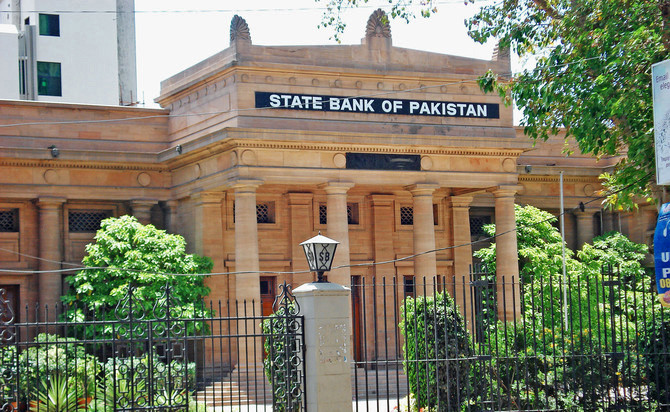
- State Bank of Pakistan projects real gross domestic product growth for fiscal year 2019 of slightly more than 4 percent
- Average inflation rate for the year expected to be between 6.5 and 7.5 percent
Alvarez & Marsal opens regional headquarters in Riyadh
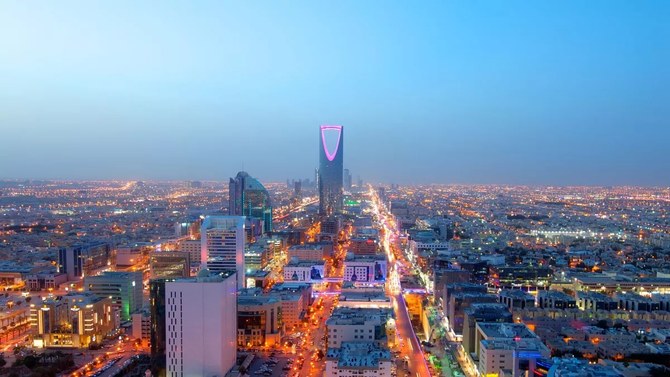
RIYADH: Underscoring international confidence in the Saudi economy, global consulting firm Alvarez & Marsal has become yet another company to have opened its regional headquarters in Riyadh.
In a press statement, the US firm stated that the inauguration of the new regional headquarters underscores its commitment to contributing to the country’s transformation agenda.
“As the company continues to deepen its roots in the country, with expertise across various sectors — from banking and tax to healthcare and disputes and investigations — this strategic move aims to leverage local insights in the Kingdom to drive sustainable growth and innovation.” the company said.
Additionally, A&M announced that it has included 13 skilled Saudi graduates in the inaugural batch of its Bidayah Graduate Program.
The company stated that these candidates were selected from a competitive pool of applicants, describing the chosen individuals as representing the bright future of the Kingdom and reflecting the potential that A&M sees in local talent.
James Dervin, managing director of A&M in the Middle East and co-head in the region, stated that the program is designed to develop the next generation of execution-focused leaders in management consulting. It is guided by the A&M principles of leadership, action, and results.
“Over the course of 12 months, participants will undergo rigorous training, engage in live project work, and receive mentorship from seasoned industry experts,” he said.
Dervin added: “Coupled with the incorporation of our regional headquarters in Saudi Arabia, the program underscores A&M’s commitment to investing in the professional development of Saudi nationals and aligning with the Kingdom’s ambitious Vision 2030,”
He further noted that the new graduates will have a significant, positive impact on his firm and the clients it serves.
Commenting on the close alignment of A&M’s global brand with the local market dynamic in Saudi Arabia, Bryan Marsal, A&M’s CEO and co-founder, said: “The all-encompassing nature of the Saudi Arabian transformation is driving significant demand for A&M’s distinctive ‘get-stuff-done’ brand of services — for our ability to fix problems, our ‘skin in the game’, and our freedom from audit conflicts.”
With over 9,000-strong workforce across six continents, A&M generates tangible results for corporations, boards, private equity firms, law firms, and government agencies grappling with intricate challenges, according to its website.
More than 180 major global companies and organizations have already established regional headquarters in the Saudi capital. These include Apple, Microsoft and Alibaba, as well as the IMF, IBM, and Google.
Other notable entities on the list include German consultancy firm TUV Rheinland, PwC Middle East, Aramex and Amazon.
UAE banks’ aggregate capital, reserves exceed $136bn
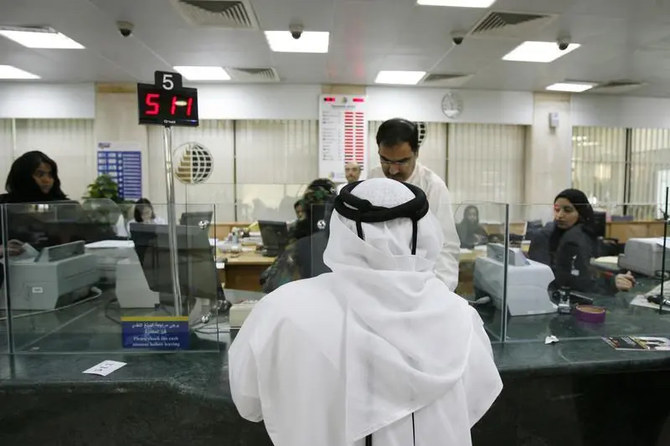
RIYADH: UAE-based banks’ aggregate capital and reserves reached 501.5 billion dirhams ($136 billion) at the end of February, up 14.4 percent year-on-year, according to new data.
The latest statistics from the Central Bank of the UAE showed that on a monthly basis, the total capital and reserves grew 0.95 percent, reflecting an increase of approximately 4.7 billion dirhams, according to the Emirates News Agency, also known as WAM.
This rise in figures falls in line with the central bank’s goal of enhancing monetary and financial stability in the country.
Moreover, the data indicated that national banks accounted for around 86.5 percent of the aggregate capital and reserves of banks operating in the UAE. At the end of February, they recorded a total of 433.7 billion dirhams, an annual rise of 14.6 percent.
On the other hand, the share of foreign banks settled at 13.5 percent, hitting 67.8 billion dirhams at the end of the same month, reflecting a 13.2 percent surge compared to the same period a year earlier.
Furthermore, at the end of February, the total capital and reserves of banks operating in Dubai alone stood at 246.4 billion dirhams, logging a year-on-year growth of 15.1 percent.
Additionally, banks operating in Abu Dhabi recorded around 217 billion dirhams, up 13 percent from the corresponding period in 2023.
Meanwhile, the cumulative capital and reserves of banks operating in other emirates combined reached an estimated 38.1 billion, reflecting a 15.5 percent climb in comparison to the same period a year prior.
In March, a top executive at Roland Berger said that UAE bank branches were witnessing the highest revenues in the region, amounting to $18.6 million per branch.
This was driven by the nation’s digital transformation, which enabled financial institutions in the Gulf Cooperation Council to reduce the number of banking branches by 328 within three years, Saumitra Sehgal, the global consulting firm’s head of financial services in the Middle East, told WAM, at the time.
Sehgal also pointed out at the time that the number of bank branches across GCC nations decreased from 4,067 at the end of 2019 to 3,739 by December 2022.
He further noted that banks in the UAE saw the highest number of outlets merge and reduce with the support of digital transformation between 2019 and 2022.
Saudi financial robo-advisory firm Abyan Capital secures $18m in funding
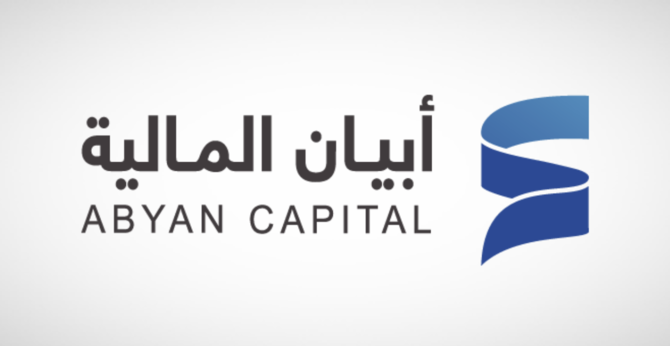
RIYADH: Financial robo-advisory firm Abyan Capital has secured $18 million in funding in further evidence of the growing confidence in the Kingdom’s artificial intelligence sector.
Led by STV, the funding round also saw participation from Aramco’s Wa’ed Ventures and RZM Investment.
Robo-advisors are digital platforms that utilize AI and machine learning algorithms to automate and optimize investment processes.
Founded in 2022 by Abdullah Al-Jeraiwi, Omar Al-Mania and Saleh Al-Aqeel, Abyan Capital is a financial services company that provides an automated solution and portfolio management for long-term investments.
“Abyan Capital stands out by unlocking the SR300 billion ($80 billion) investment management and wealth advisory sector for investors from all backgrounds in Saudi Arabia, through its mobile-first, robo-advisory model,” Yazeed Al-Turki, principal at STV, said in a statement.
In a short period of time, he said Abyan has enabled a large base of first-time investors to access multiple wealth management solutions, underscoring the team’s commitment to innovation and inclusivity.
“We are delighted to partner with Abdullah, Saleh and the team on their journey to redefine the wealth management ecosystem in the Kingdom,” Al-Turki added.
The company aims to utilize its newly secured funds to further enhance its platform, expand its suite of financial products, and accelerate its market penetration across the investment solution value chain.
“Today, we are proud that in a very short amount of time, Abyan has exceeded deposits of over SR1.4 billion and more than 100,000 portfolios invested. And we will be launching new diversified products soon with a goal to make Abyan the digital retail investment house,” said Al-Jeraiwi, the CEO.
Closing Bell: TASI ends the week in green at 12,352
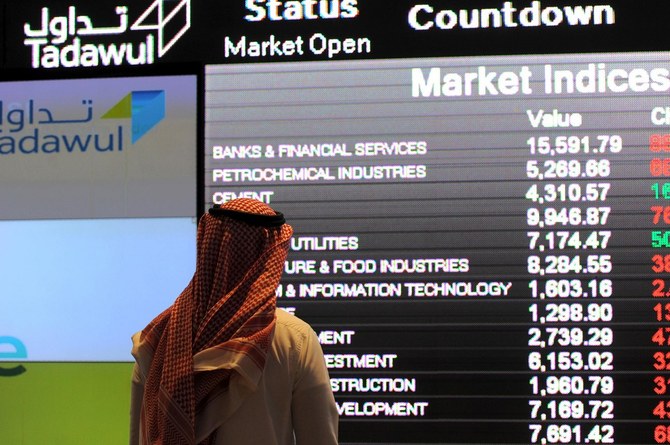
RIYADH: Saudi Arabia’s Tadawul All Share Index ended the week by gaining 6.68 points, or 0.05 percent, to close at 12,352.33 on Thursday.
The total trading turnover of the benchmark index was SR6.55 billion ($1.74 billion) as 120 stocks advanced, while 103 retreated.
The parallel market, Nomu, also gained 95.60 points, or 0.36 percent, to close the trading session at 26,457.81. This comes as 29 stocks advanced, while as many as 27 retreated.
On the other hand, the MSCI Tadawul Index slipped by 2.37 points, or 0.15 percent, to close at 1,547.20.
The best-performing stock on the benchmark index was Al-Baha Investment and Development Co., as its share price surged by 7.69 percent.
Other top performers included Raydan Food Co. and the Company for Cooperative Insurance, whose share prices soared by 7.29 percent and 6.63 percent, to stand at SR30.90 and SR160.80 respectively.
Electrical Industries Co. and the Mediterranean and Gulf Insurance and Reinsurance Co. also fared well during the last trading session of the week.
The worst performer was Saudi Chemical Co., whose share price dropped by 5.36 percent to SR7.77.
Power and Water Utility Co. for Jubail and Yanbu as well as the National Company for Glass Industries, underperformed as their share prices dropped by 5.22 percent and 4.82 percent to stand at SR63.50 and SR42.45, respectively.
On the announcements, Bank AlJazira announced its interim financial results for the period ending March 31 with net profit amounting to SR300.4 million compared to SR279.3 million in the previous quarter.
In an official statement on Tadawul, the bank attributed the increase in the net income to a decrease in total operating expenses by 6 percent.
“The decrease in total operating expenses is mainly due a decrease in net impairment charge for financing and other financial assets, other general and administrative expenses, salaries and employee-related expenses and other operating expenses against an increase in depreciation and amortization expenses,” the statement said.
Conversely, there has been a slight decrease of 0.2 percent in total operating income, primarily attributed to a reduction in net financing and investment gains. Additionally, the rise in net income was partially tempered by increased zakat charges over the period.
GCC central banks hold interest rates steady for 6th time following Fed’s move
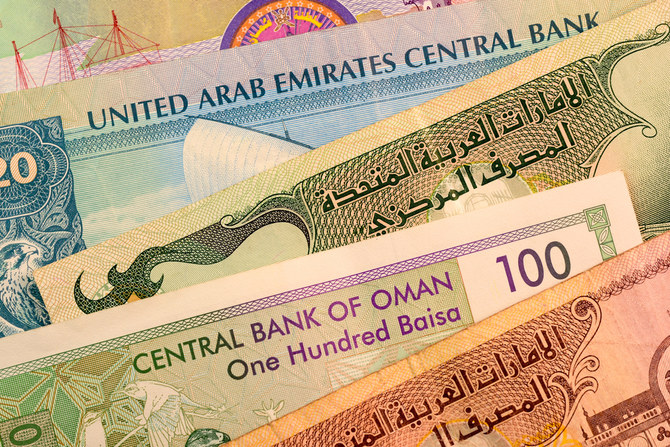
RIYADH: Gulf Cooperation Council central banks have held interest rates steady for the sixth time as the US Federal Reserve keeps its benchmark level between 5.25 percent and 5.50 percent.
As most currencies in the region are pegged to the US dollar, monetary policy follows the decisions taken in Washington, with policymakers opting to lock the rate at the level it has been since July.
The freeze comes as the rate-setting panel cites “a lack of further progress toward the committee’s 2 percent inflation objective.”
Vijay Valecha, chief investment officer at Century Financial, told Arab News: “This decision marks the sixth consecutive time that the central bank has chosen to keep rates unchanged. Market expectations have adjusted, now forecasting only one rate cut by year-end compared to the six anticipated at the beginning of 2024.”
He added: “The monetary policies of most central banks in the GCC countries, including the UAE, Saudi Arabia, Bahrain, Oman, and Qatar, typically mirror those of the Fed due to their currencies being pegged to the US dollar. Kuwait is the exception in the bloc, as its dinar is linked to a basket of currencies.”
Valecha continued by stating that as a result, interest rates in GCC markets are also anticipated to remain stable in the near future, which bodes well for the profitability of GCC banks.
This decision implies that the Saudi Central Bank, also known as SAMA, will maintain its repo rates at the current level of 6 percent.
The UAE central bank, along with Kuwait, Qatar, Oman, and Bahrain, also mirrored the Fed’s move.
Repo rates, which represent a form of short-term borrowing primarily involving government securities, underscore the close economic ties and financial dynamics between the GCC countries and the global economic landscape, particularly the US.
The US central bank also stated that it “does not expect it will be appropriate to reduce the target range until it has gained greater confidence that inflation is moving sustainably toward 2 percent.”
This indicates that rate cuts are not on the cards anytime soon, until inflation cools down and moves sustainably toward the 2 percent target set by the US Fed.



